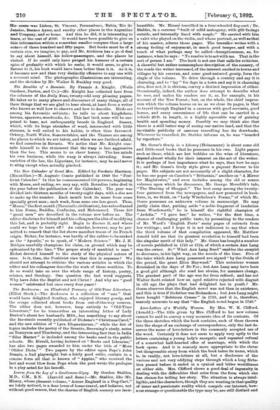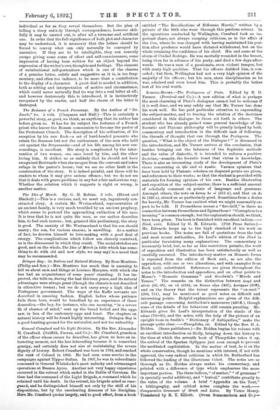Love - Letters of a Worldly Woman. By - Mrs. W. K. Clifford.
(Arnold.)—The title given by Mrs. Clifford to her new volume cannot be said to convey a very accurate idea of its contents. Of the three sketches which the book contains, each of them thrown into the shape of an exchange of correspondence, only the last de- serves the name of love-letters in the commonly accepted use of the word. Certainly it does not seem to apply very aptly to the letters containing a young lady's energetic and -repeated refusal of a somewhat half-hearted offer of marriage, with -which the book opens. And it is scarcely more appropriate to the clever but disagreeable story from which the book takes its name, which is, in reality, not love-letters at all, but a disclosure of the various and not very edifying steps through which a long flirta- tion passed before it ended in a cynical and bitter worldliness on either aide. 'Mrs. Clifford shows a good deal of ingenuity in dealing with the difficulties that arise from the form which she has chosen for telling her story. The situation is always intel- ligible, and the characters, though they are wanting in that quality of inner and passionate reality which compels our interest, how- ever strange or questionable the type may be, are still distinct and
individual as far as they reveal themselves. But the plan of telling a story entirely through correspondence, however skil- fully it may be carried out, is after all a tiresome and artificial one. In order that the full significance of both plot and character may be understood, it is necessary that the letters should be forced to convey what can only naturally be conveyed by narrative. If they are to be intelligible, they can scarcely escape giving some sense of effort and self-consciousness, some impression of having been written for an object beyond the expression of the writer's own thoughts and feelings. The element of unintentional self-portraiture which is one of the charms of a genuine letter, subtle and suggestive as it is, is too frag- mentary, and often too indirect, to be more than a contribution to the display of a character. A great deal is needed in addition, both as setting and interpretation of motive and circumstance, which could never naturally find its way into a real letter at all; and however dexterously this is introduced, it is instinctively recognised by the reader, and half the charm of the letter is destroyed.







































 Previous page
Previous page